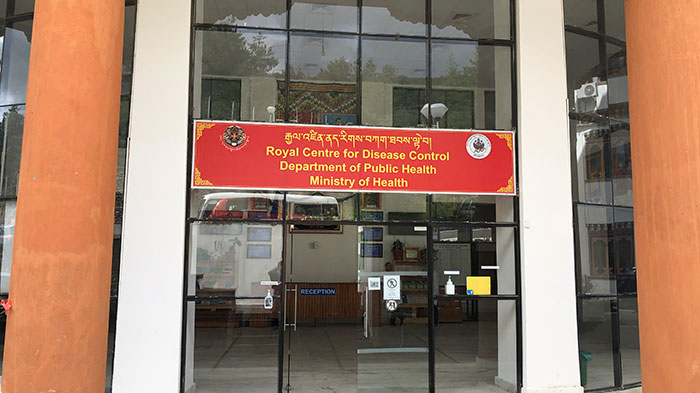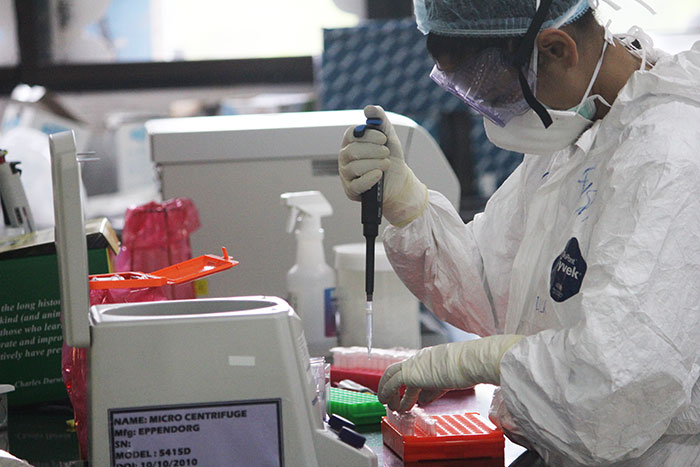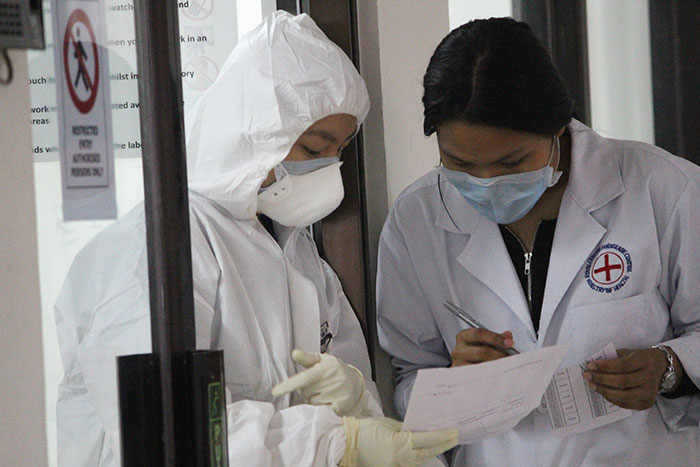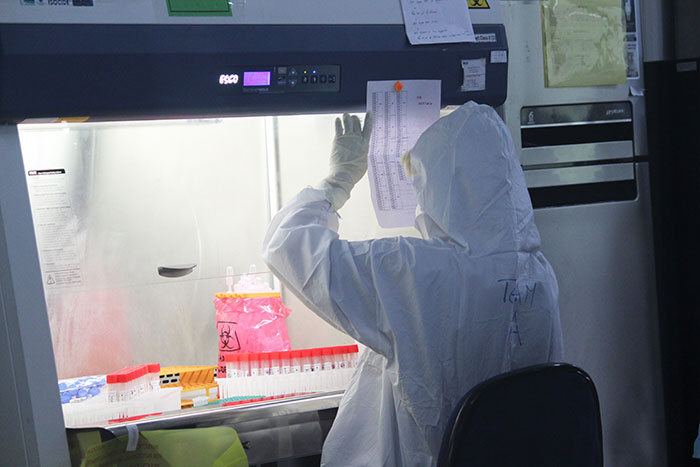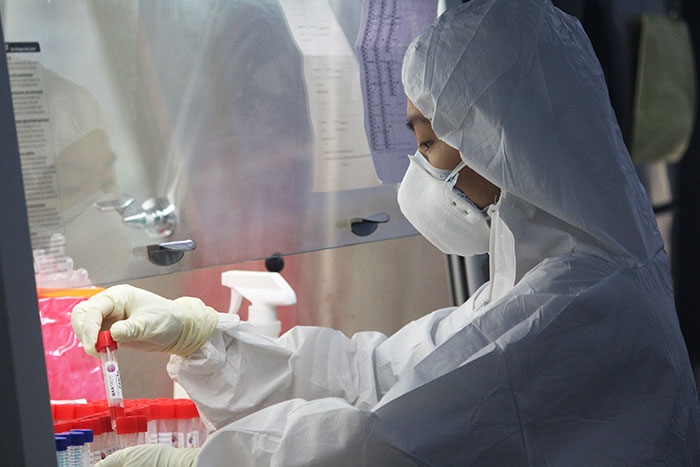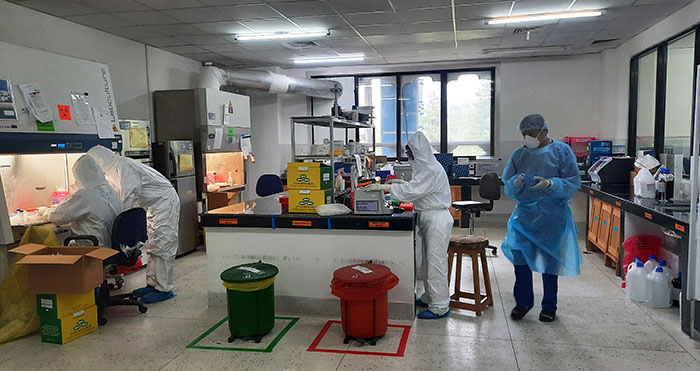Younten Tshedup
A career that has traditionally been overshadowed by the other more visible healthcare professions is suddenly in the limelight.
Behind the daily ‘positive and negative’ results flashed across various media outlets are the hours of arduous labour of these professionals – laboratory technicians and scientists.
It’s almost midnight at the Royal Centre for Disease Control (RCDC) in Thimphu. Donning the white and red coveralls (protective suit), some 10-laboratory officials are busy working behind the transparent walls of a negatively pressurised room.
They are conducting the reverse transcription- polymerase chain reaction (RT-PCR) test, the only confirmatory test for Covid-19 on more than 2,000 samples that have come from Phuentsholing.
The centre has been receiving almost 4,000 samples daily since the beginning of the lockdown on August 11.
The centre’s head, Dr Sonam Wangchuk said that following the Covid-19 outbreak in Phuentsholing the centre was asked to screen the entire population in the border town to find out the extent of the outbreak.
“The 12 positive cases in connection to the first case in Phuentsholing was quite alarming. Suspecting an extensive transmission in the community we initiated mass testing in Phuentsholing.”
At the RCDC
Technically, the center has been functioning 24 hours since the lockdown with emergency testing happening every now and then.
Chief laboratory officer, Binay Thapa, said that 19 laboratory officers conduct the RT-PCR test daily with a test rate of over 3,800. The team works for almost 14 hours a day.
Currently, there are four RT-PCR machines at RCDC that can perform 330 tests at a time.
Besides the 19 individuals conducting the confirmatory test, there are four more officials from the centre performing the rapid diagnostic tests. There are separate teams for surveillance, record keeping and logistics.
None of them has left the facility after the lockdown. The centre is their home.
Binay Thapa who is also a medical microbiologist said that the team has been gaining momentum with its daily testing rate. “The initial days following the mass screening in Phuentsholing were difficult. The number of samples we received was overwhelming.”
However, he said that the team is now almost catching up with the samples that arrive daily. “We should be able to perform a test on all the samples on the same day we get them.” More than 27,000 samples from the ongoing active screening in Phuentsholing would be brought to the centre for testing.
While the numbers are already overwhelming, should multiple dzongkhags report local transmission it would be a major challenge for the team. For this RCDC has introduced a new strategy of ‘pooled testing’.
Binay Thapa said that samples from multiple people (random) are combined to save time and precious testing resources. “We can pool samples of five, 10, 20 or if worse comes to worst, even 30 samples at a time.”
If a positive result is shown in a particular batch, the samples from the batch are individually tested again to identify particular samples. “While people might question this method, it’s a proven and effective method used by developed countries where the numbers of samples are huge.”
The pooled testing mechanism is already in practice. So far the highest number of samples pooled was 10 from the samples arriving from Phuentsholing.
Challenges
Shortage of trained manpower and equipment remains the biggest challenge for the frontliners in the laboratories.
Dr Sonam Wangchuk said that unlike the other laboratory tests, the RT-PCR testing is a bit sophisticated procedure and needs expertise.
He said that the entire process, from collecting samples from the field to extraction of the genetic material of the virus manually needs expertise.
“Initially, we managed with eight of our own staff but it was not enough,” he said. “We then brought in those who knew about the testing procedures from the animal and food health as well.”
The centre has also distributed PCR machines and trained laboratory officials at the three Covid-19 centres in Mongar, Phuentsholing and Gelephu.
The centre was then asked to procure new machines. However, given the global demand for machines it proved difficult. “Every lab in the world is trying to get the equipment including consumables and the PCR reagents. So even if we have money, there is no supply.”
Logistics (vehicles for ferrying samples) according to Dr Sonam Wangchuk was another challenge. However, he said that the issue is being addressed.
Preparedness
Following the local transmission in Phuentsholing the centre also placed orders for additional test kits and reagents. Recently, two aircraft arrived in the country laden with 13 tonnes of reagents.
To address the manpower shortage, over 150 students of Khesar Gyalpo University of Medical Sciences of Bhutan have also been trained in sample collection.
They are deployed in Thimphu for collecting samples from those who had visited Phuentsholing on or after August 1.
Dr Sonam Wangchuk said that in terms of response, this has been a worst-case scenario so far. “Everyone is engaged for now and we have gone all out to prevent this outbreak from spreading.”
He said that until a vaccine is available, the population will be susceptible to new infection. “Ultimately it is the human behaviour – maintaining physical distance, wearing face masks and hand washing – that may reduce the number of outbreaks in the future.”
“Everyone is tired by now and there is fatigue among the health workers. When health workers are exhausted, the safety gets compromised, and this is a major concern.”
